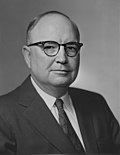| | |||||||||||||||||
November 7, 1972 | |||||||||||||||||
| |||||||||||||||||
 County results Eastland: 40-50% 50-60% 60-70% 70-80% 80-90% Carmichael: 40-50% 50-60% | |||||||||||||||||
| |||||||||||||||||
| Elections in Mississippi |
|---|
 |
The 1972 United States Senate election in Mississippi was held on November 7, 1972. Incumbent Democratic U.S. Senator James Eastland won re-election to his sixth term. To date, this was the last time that the Democrats won the Class 2 Senate seat in Mississippi. Mississippi was one of fifteen states alongside Alabama, Arkansas, Colorado, Delaware, Georgia, Iowa, Louisiana, Maine, Minnesota, Montana, New Hampshire, Rhode Island, South Dakota, and West Virginia that were won by Republican President Richard Nixon in 1972 that elected Democrats to the United States Senate.

